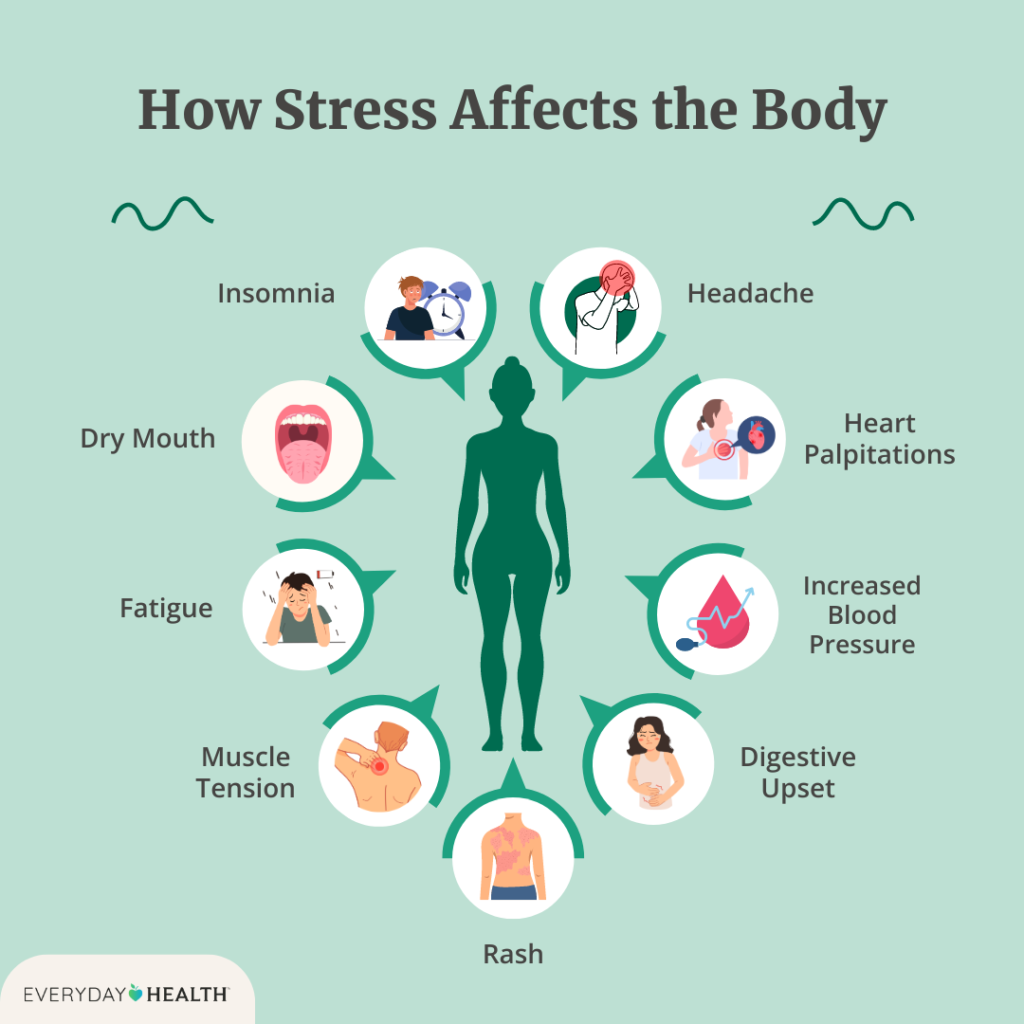How to overcome Stress: A Way to Emotional Well-being and Resilience
Stress has become a common part of modern life, impacting our mental and physical health in profound ways. While short-term can serve as a motivator, prolonged or chronic can lead to negative outcomes, affecting our health, relationships, and overall quality of life. By understanding stress, practicing mindfulness, and building effective coping strategies, we can regain control and improve our resilience. This article explores its impact, along with practical strategies for managing it under these key headings.

Emotional Well-being and Stress
Emotional well-being forms the foundation of a healthy, balanced life. It influences how we think, feel, and act, When becomes overwhelming, it can disrupt emotional stability, leading to anxiety, irritability, sadness, and other negative emotions. Long-term exposure to high levels can even contribute to serious mental health issues like depression and chronic anxiety disorders.
To maintain emotional well-being amidst life’s challenges, consistent self-care is essential. This might include setting aside time for relaxation, pursuing hobbies, and building supportive relationships. Identifying personal triggers and learning to manage them is crucial to preventing them from impacting mental and emotional health.
How Stress Affects Emotional Well-being
When we experience stress, our bodies release hormones such as cortisol and adrenaline, which prepare us to react to threats. However, if these hormones stay elevated over time, they can cloud our thinking, make us feel anxious, and lead to emotional instability. Common effects of chronic on emotional well-being include:
- Increased Anxiety and Restlessness: Constant can make us feel on edge and unsettled.
- Difficulty Concentrating: Prolonged impairs our ability to focus, think clearly, and make decisions.
- Irritability and Frustration: Small annoyances may feel magnified under high-stress conditions.
- Feeling Overwhelmed: Persistent can create a sense of helplessness or emotional exhaustion.
By recognizing stress symptoms early, we can protect our emotional well-being and prevent stress from taking a toll on mental clarity.
Mindfulness Techniques for Managing Stress
Mindfulness is the practice of focusing on the present moment without judgment. Research has shown that mindfulness can reduce, improve emotional resilience, and sharpen focus. Incorporating mindfulness techniques into daily routines can help manage effectively.
Popular Mindfulness Techniques for Stress Relief
- Deep Breathing: Slow, controlled breathing can reduce heart rate and calm the mind. Try inhaling deeply for four counts, holding for four, and exhaling for four, repeating until you feel more relaxed.
- Body Scan: Lie down and mentally “scan” each part of your body from head to toe, noticing any tension and letting it go. This exercise promotes relaxation and awareness of bodily sensations.
- Mindful Observation: Focus intently on a single object, observing its texture, shape, and color. This technique redirects your mind away from and towards something calming.
- Gratitude Journaling: Writing down things you’re grateful for can shift your focus from stressors to positive aspects of your life, fostering a more optimistic outlook.
Consistent practice of these techniques can significantly lower levels and improve emotional resilience, helping you navigate life’s challenges with a calmer mind.
Coping Mechanisms for Anxiety
Anxiety often accompanies it, amplifying its effects. To manage anxiety effectively, it’s helpful to adopt practical coping mechanisms that help regain control and balance.
Effective Coping Mechanisms for Anxiety
- Positive Self-Talk: Counter negative thoughts with positive affirmations. Remind yourself, “I can handle this,” to foster a resilient mindset.
- Physical Activity: Exercise releases endorphins, which reduce anxiety and improve mood. Even short activities, like a quick walk or stretching, can have an immediate positive impact.
- Limit Caffeine and Sugar: Excessive caffeine and sugar intake can trigger anxiety symptoms. Reducing these can help you maintain a stable mood.
- Social Connection: Talking to a friend, family member, or therapist can offer comfort and new perspectives on challenging situations.
- Break Tasks into Smaller Steps: Large tasks can feel overwhelming, especially for those prone to anxiety. Dividing tasks into manageable parts can reduce and improve focus.
Incorporating these coping strategies into your routine can help manage anxiety and improve overall well-being.

Building Self-Esteem to Reduce Stress
Low self-esteem often intensifies, as it can make us doubt our ability to handle challenges. Building self-esteem helps boost confidence, making it easier to face and manage.
Tips for Building Self-Esteem
- Set Achievable Goals: Setting and achieving small, realistic goals creates a sense of accomplishment, which builds confidence over time.
- Challenge Negative Self-Talk: Replace self-critical thoughts with positive statements to gradually improve self-esteem.
- Practice Self-Compassion: Be kind to yourself, especially after setbacks. Self-compassion helps you learn from mistakes without harsh self-judgment.
- Celebrate Progress: Reflect on your growth and celebrate personal achievements, no matter how small, to reinforce a positive self-image.
- Seek Professional Help if Needed: Low self-esteem may stem from unresolved issues that benefit from counseling or therapy. A mental health professional can guide you toward positive self-growth.
Building self-esteem takes time, but these small efforts can empower you to manage stress more effectively, feel more in control, and approach challenges with confidence.
Practical Ways to Relieve Stress
There are various techniques to relieves, ranging from physical activities to creative outlets. The goal is to find activities that resonate with you and make them part of your daily life.
Effective Stress-Relief Techniques
- Exercise Regularly: Physical activity stimulates endorphin production, which naturally boosts mood and relieves it.
- Engage in Hobbies: Activities like painting, gardening, or reading shift focus from stressors to enjoyable tasks, providing a mental break.
- Practice Time Management: Organizing and prioritizing tasks helps create a balanced day, reducing feelings of being overwhelmed.
- Spend Time in Nature: Being outdoors reduces cortisol levels, encouraging relaxation and a sense of peace.
- Listen to Music: Soothing music can elevate mood and reduce. Music therapy is even used to promote relaxation and emotional healing.
- Practice Yoga and Meditation: Yoga and meditation are proven methods for reducing, promoting mindfulness, and enhancing well-being.
Experimenting with these techniques can help you find what works best for you. Consistency is key to maintaining long-term relief.
Overcoming Stress: Practical Steps and Insights
Overcoming stress is a gradual process that involves understanding stress triggers, adopting healthy habits, and practicing management techniques.
Steps to Overcome Stress
- Identify Triggers: Start by identifying specific events or thoughts that trigger stress. Keeping a journal can help you recognize patterns.
- Set Boundaries: Learning to say “no” when you’re overwhelmed can help preserve time for self-care and prevent burnout.
- Develop a Support System: A network of supportive friends, family, or colleagues can provide comfort and reduce feelings of isolation.
- Prioritize Self-Care: Making time for relaxation, exercise, and hobbies helps you recharge and face challenges with renewed energy.
- Take Breaks: Scheduled breaks throughout the day allow you to recharge and improve productivity.
- Focus on Solutions: Shift focus from the problem to potential solutions. Problem-solving reduces and builds confidence.
- Seek Professional Help if Needed: For chronic or overwhelming stress, therapy or counseling may provide valuable support. Mental health professionals offer personalized strategies and guidance.
Long-Term Benefits of Overcoming Stress
Effectively managing doesn’t eliminate life’s challenges, but it strengthens resilience and equips us to face them confidently. Mastering management can lead to:
- Improved mental clarity and focus
- Better relationships and social interactions
- Increased productivity and creativity
- Greater emotional resilience and confidence
- Improved physical health and well-being
Outcome
Stress is a natural part of life, but it can be managed effectively with the right strategies. Focusing on emotional well-being, practicing mindfulness, developing strong coping mechanisms, and building self-esteem are essential steps for reducing. Exploring different relief methods helps individuals find what works best for them. Remember, overcoming is a journey that requires commitment, patience, and self-compassion. The rewards are a healthier mind, and body, and overall life satisfaction.

1. What is stress, and why does it occur?
Answer: Stress is the body’s natural response to challenging or demanding situations. It triggers a “fight-or-flight” reaction, releasing hormones like cortisol and adrenaline, which prepare us to handle threats. can be caused by various factors, such as work pressures, personal life challenges, financial issues, or unexpected changes. While stress can be motivating in small doses, prolonged stress may negatively impact mental and physical health.
2. What are the common signs of stress?
Answer: Common signs include physical symptoms like headaches, muscle tension, fatigue, and sleep issues, as well as emotional signs like irritability, anxiety, sadness, and difficulty concentrating. Behavioral changes, such as overeating, isolation, or reliance on substances, can also be indicators of stress.
3. How does stress impact physical health?
Answer: Chronic can lead to various health problems, including high blood pressure, weakened immune function, digestive issues, and heart disease. It can also exacerbate conditions like diabetes and asthma. Long-term stress keeps the body in a constant state of tension, which disrupts natural bodily functions and can contribute to disease
4. What are effective ways to manage stress?
Answer: Stress management techniques include regular physical activity, relaxation practices like deep breathing and meditation, a balanced diet, and good sleep hygiene. Talking with friends, family, or a therapist can also provide emotional support. Setting boundaries, time management, and taking breaks can also help to reduce stress levels.
5. When should I seek professional help for stress?
Answer: If stress feels overwhelming, lasts for an extended period, or starts to interfere with daily life, it may be time to seek professional help. Signs include ongoing feelings of anxiety, depression, changes in behavior, or trouble managing tasks at work or home. A mental health professional can provide coping strategies and therapeutic support to manage effectively.







